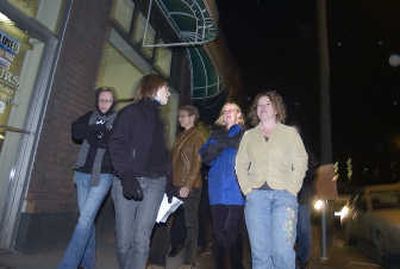Events put focus on region’s homeless

It was a day to draw attention to the plight of the hungry and homeless, a day for questioning whether everybody is doing their fair share to address the problem of poverty in Spokane.
At the downtown Women’s Hearth, the chairwoman of the Mayor’s Housing Task Force said Thursday that hunger and homelessness is a regional problem that should be addressed not just by the city of Spokane, but by Spokane County, Spokane Valley and Airway Heights as well.
Regarding Spokane Valley, for instance, “why does a city of 80,000 people not have a human services line item in their budget?” asked Marty Dickinson, who is also president of Downtown Partners. In fact, Spokane Valley dedicated less than 1 percent of its 2007 budget – $45,000 – for social service requests.
As part of local recognition of National Hunger and Homelessness Awareness Week, Dickinson spoke at the start of the Spokane Housing Coalition’s annual Awareness Walk to shelters, meal centers and other facilities for the poor.
Though much attention has been paid to the closure of three buildings housing low-income residents, Dickinson said, affordable housing is not just about big buildings downtown. It’s about the need for triplexes, duplexes and single-family units in the suburbs, too.
Later Thursday, about two dozen people gathered at a candlelight vigil in front of the Otis Hotel, 110 S. Madison, in memory of a “shattered community.”
Thursday was the deadline for all residents of the Otis to leave or be forced out.
“Providers have done an outstanding job of finding housing” for the residents of the Otis, the Commercial Building and the New Madison, said Cathy Mann, executive director of Voices, a low-income advocacy group. But “community” is about more than housing.
“It’s about finding your friends, it’s about finding your route and a comfortable place to go and talk.”
Bob Peeler, of Spokane Neighborhood Action Programs, said he believes all but one Otis resident have left.
“She is physically having a hard time due to her disability,” Peeler said.
He said the Otis housed seniors as well as the mentally and physically disabled. Only a handful of the residents were sex offenders, he said, though the media seemed to focus on these.
Thursday night, the Chief Garry Park Neighborhood Council also took up the issue of homelessness at Stevens Elementary School, which is one block away from a tent city that grew to more than 30 people over the course of three weeks.
“I’ve deemed it a chronic nuisance,” Spokane police Neighborhood Resource Officer Shaney Redmon told a crowd of about 70 residents gathered at the council’s monthly meeting.
She said the owner of the property, Realtor Robert Gilles, has agreed to meet with her about complaints – ranging from disorderly conduct to assault – against the campers on his property.
Heather Trautman of the city’s code enforcement office told angry neighbors that she expected the city to “put forward an ordinance” by the end of the year or early next year to address the problem.
Though police, fire, code enforcement investigators and health officers have all visited the site, there apparently is no law that can force the campers to move off private property.
Though a few among the neighbors expressed compassion for the homeless, most expressed frustration with the tent city, which they said would not be tolerated in more affluent parts of Spokane.
“We want you out of our neighborhood,” resident Heather Fetters told tent city organizer Dave Bilsland. “How can we get you out?”
To which Bilsland responded, “If I could find a more friendly site, we would go.”